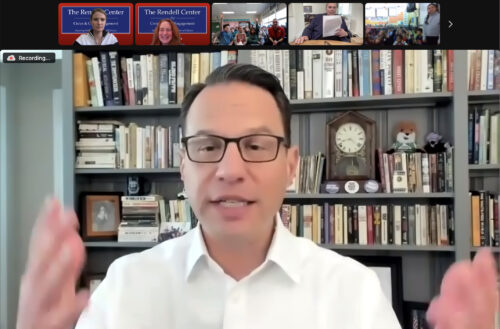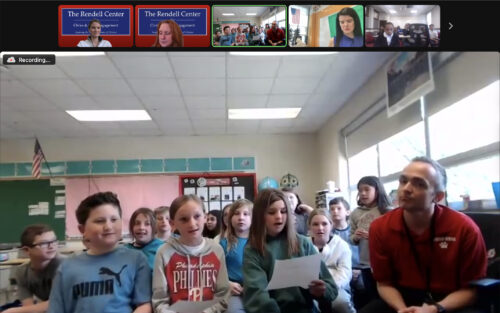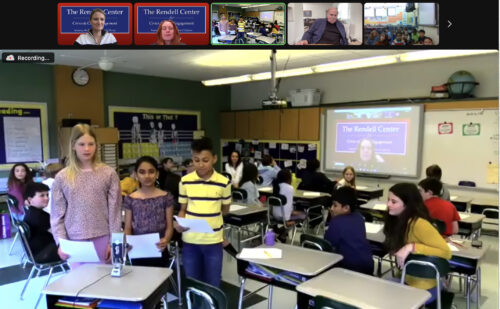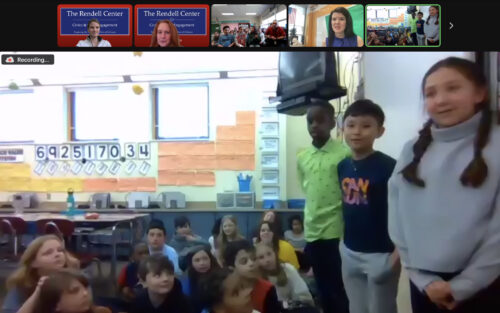Fourth- and fifth-grade students from across the Commonwealth got the opportunity to pose questions to Pennsylvania Gov. Josh Shapiro about issues on their minds this month during an online Youth Town Hall sponsored by the Rendell Center for Civics and Civic Engagement, in partnership with the Annenberg Public Policy Center.
The Rendell Center’s co-founders, former Gov. Ed Rendell and Senior U.S. Court of Appeals Judge Marjorie O. Rendell, hosted the hourlong virtual Youth Town Hall, at which students from 10 classes asked questions of the governor while another 223 classes tuned in. The center had previously solicited questions from classes across the state, and received over a hundred from which to select.

The students asked Shapiro about his priorities and about the after-school activities he took part in when he was in school, about the high cost of health care and school safety.
“Every day more and more kids are losing their lives to gun violence, especially in Philadelphia, including one of our own classmates last year,” said a student in Bridget Braun’s fourth-grade class at Smedley Elementary School, a Mastery Charter School. Another student completed the question: “What are you going to do to protect us, the children of Philadelphia?”
“I’m sorry that you even have to ask me that question,” Shapiro replied. “That breaks my heart. But I’m glad you are asking it, because as students you have a right to go to a school that’s safe. You have a right to walk down the street and not worry about hearing gunshots. And you have a right to grow up in a world where you don’t know people that get shot and killed. And I’m sorry about learning about the student in your school, your friend, who was killed. I’ve spent too much time with moms and dads whose kids have been shot and killed. I’ve spent too much time at rec centers mourning the loss of kids who have been killed. It’s not OK. And I will tell you I think it’s going to require us to do a lot of different things, right?
“One is making sure you’ve got a really good safe school to go to. And we’re working hard on that. Two is making sure we get guns out of the hands of kids and criminals and others who aren’t allowed to have them. … And we need to make sure that those laws are enforced and we need to make sure that no one can get their hands on a gun who shouldn’t have them. I think that’s really, really important.”
Students in Kelly Gallagher’s fourth-grade class in Upper Moreland Intermediate School asked the governor, who took office in January, what he saw as the biggest problem facing public schools and what he thought should be done to fix it. “I really think we’re doing a bad job helping kids with mental health issues,” Shapiro said. “I’ve visited a lot of schools and I’ve talked to a lot of students, and they want more people they can talk to in their schools.”
He said the state was putting a half-billion dollars into letting schools hire mental health counselors. “That’s a really important thing for me and I think it’s going to really help our students.”
On a lighter note, students asked him his thoughts about shifting to a four-day school week.
“I’m not sure I am ready to embrace the idea of a four-day school week,” said Shapiro, who asked the fifth graders in Nicole Allison’s class at Avis Elementary School in the Jersey Shore School District, in Clinton County, to write him a longer essay listing the pros and cons of a four-day school week vs. five days. He also asked for their ideas about what time the school day should start. Instead of cutting out one day of school each week, he suggested that a day could be used for more field trips, or activities with local businesses, or collaborative work online.
“I’m not sure I would be open to giving you less time at school,” said Shapiro, whose mother was a teacher. “Although I would be open to giving you one day less of homework a week,” adding, “I think homework is way overrated.”
Founded in 2014, the nonpartisan Rendell Center promotes civic education and engagement by working with K-12 teachers, administrators and classes. The Rendell Center is a partner of the Annenberg Public Policy Center (APPC) of the University of Pennsylvania, which was established in 1993 to educate the public and policy makers about communication’s role in advancing public understanding of political, science, and health issues at the local, state, and federal levels.





